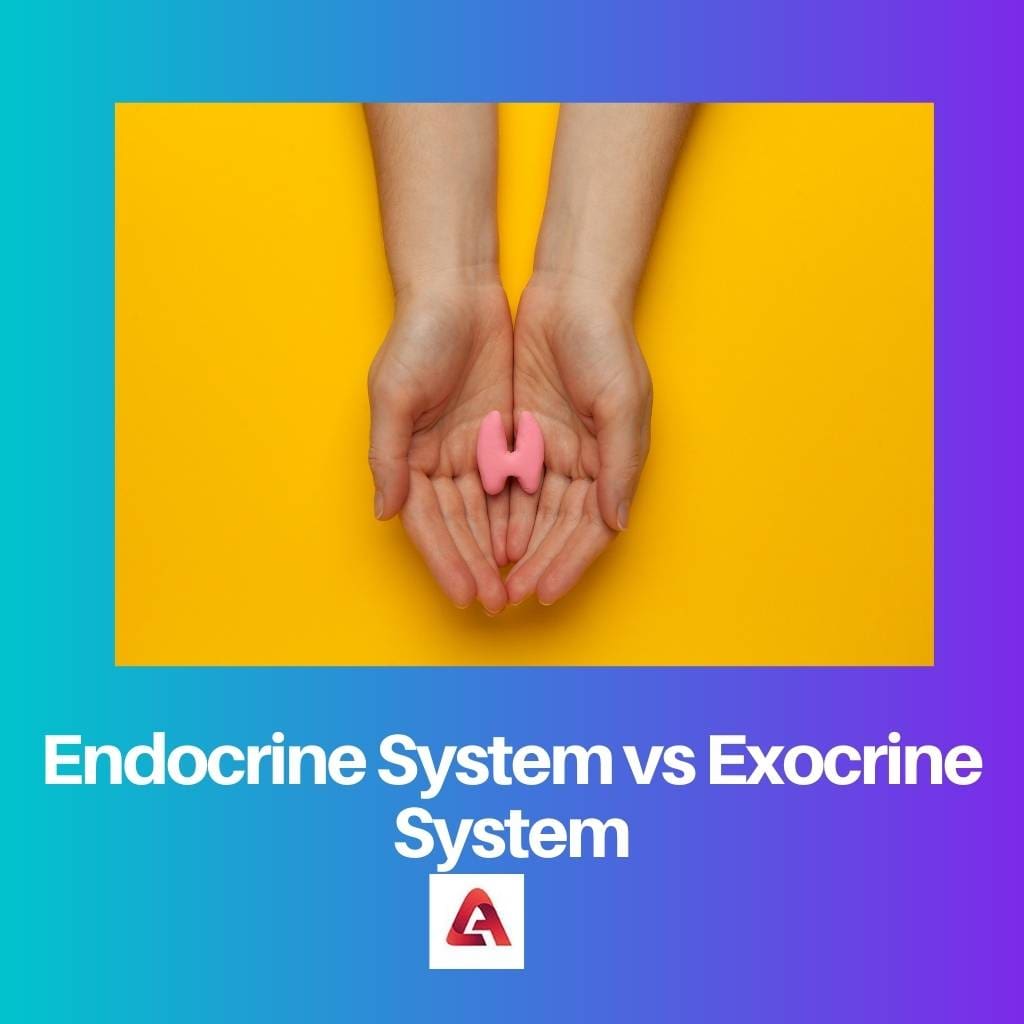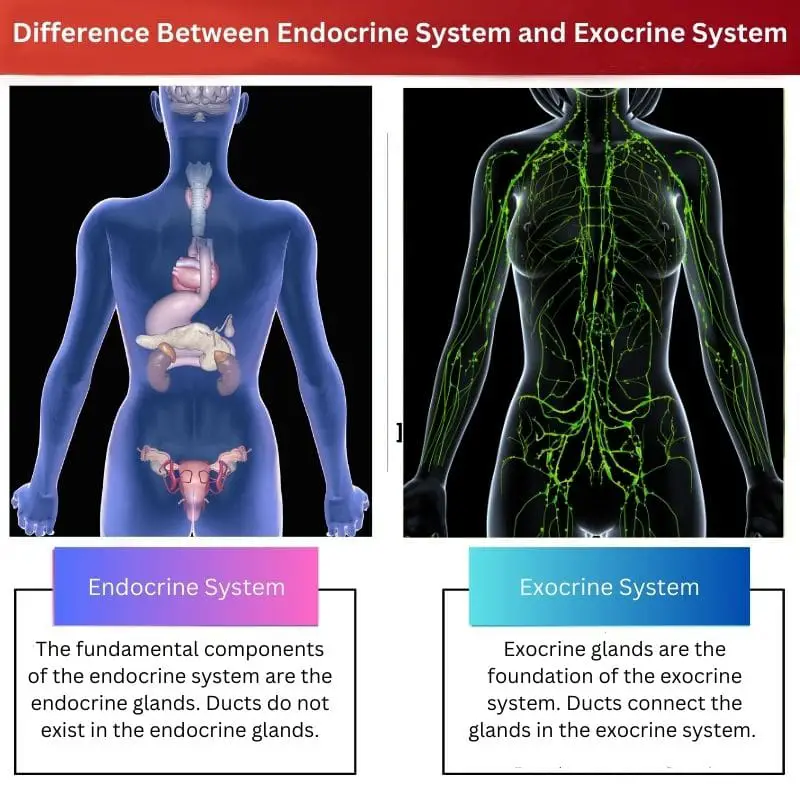Hormones are secreted by glands in our bodies, which are split into two types: endocrine and exocrine glands. Hormones are essential for the proper functioning of the body’s many organs and organ systems.
Hormones are chemical messengers that assist our bodies in functioning properly. The endocrine system is made up of endocrine glands, while the exocrine system is made up of exocrine glands.
Key Takeaways
- The endocrine system consists of glands that secrete hormones directly into the bloodstream, while the exocrine system involves glands that release substances through ducts to the body’s surface or cavities.
- Endocrine glands regulate various bodily functions such as metabolism, growth, and reproduction, while exocrine glands produce substances like sweat, saliva, and digestive enzymes.
- Examples of endocrine glands include the pituitary, thyroid, and adrenal glands, while exocrine glands include sweat glands, salivary glands, and the pancreas.
Endocrine System vs Exocrine System
The endocrine system is composed of glands that make hormones. They are ductless glands that secrete their substances directly into the bloodstream. The exocrine system is made of glands that make substances like sweat and tears that are released through ducts onto your body’s surfaces.

Endocrine glands are the main components of the endocrine system. The glands of the endocrine system directly release their production and secretions into the bloodstream.
The basic components of the exocrine system are the exocrine glands. Exocrine gland secretions do not enter the circulation. Exocrine gland enzymes and secretions move at a faster rate.
Comparison Table
| Parameters of Comparison | Endocrine System | Exocrine System |
|---|---|---|
| Consists of | Endocrine glands. | Exocrine glands. |
| Ducts: Presence/Absence | Possess ducts. | Do not possess ducts. |
| Secretary Products | Hormones. | Enzymes such as sweat, sebum, enzymes and mucus. |
| Pouring into bloodstream | Directly pour into the bloodstream. | Are not poured into the bloodstream. |
| Rate of transportation | Takes place at a slower pace. | Takes place at a faster pace. |
| Response time | The response time is slow. | The response time is fast. |
| Examples | The pineal gland, pituitary gland, liver, ovaries, pancreas, thyroid gland, testes, thalamus gland. | salivary glands, sebaceous glands, Mammary glands. |
What is Endocrine System?
The fundamental components of the endocrine system are the endocrine glands. Ducts do not exist in the endocrine glands. Hormones, for example, are secreted by the endocrine system.
Endocrine glands are also called “ductless glands.” The word “endo” means “within,” and the word “crisis” means ”to secrete.”
The rate at which endocrine gland secretions are transported is slower. Because the transit is through blood, the response time of endocrine glands is long.

What is Exocrine System?
Exocrine glands are the foundation of the exocrine system. Ducts connect the glands in the exocrine system. Sweat, sebum, enzymes, and mucus are all secreted by the exocrine system.
The glands that constitute exocrine systems are known to deposit all their secretions onto the epithelial surfaces, both external and internal.
The rate of transmission of exocrine gland enzymes or secretions is faster. Exocrine glands have a quick response time because they move through ducts.

Main Differences Between Endocrine System and Exocrine System
- The response time of endocrine glands is slow, as the passage is through blood. On the other hand, the response time of exocrine glands is fast, as the passage is through ducts.
- Examples of endocrine glands are the liver, ovaries, pancreas, thyroid gland, testes, thalamus gland, pineal gland, and pituitary gland.

- https://journals.physiology.org/doi/abs/10.1152/ajpendo.1999.276.2.e223
- https://academic.oup.com/endo/article-abstract/133/5/2371/3035883

The article’s comparison of endocrine and exocrine glands is well-structured, providing a comprehensive understanding of their functions and secretion processes.
Absolutely! The detailed descriptions and examples greatly contribute to the overall clarity and depth of the content.
Precisely! The clear distinction between the endocrine and exocrine systems is presented in a manner that is both informative and easily digestible.
The article effectively summarizes the concept and roles of hormones and the endocrine system in the body. It provides a clear comparison of the endocrine system and the exocrine system, outlining their key differences and functions.
Absolutely! The references provided also add credibility to the content presented. It’s a well-structured and informative piece.
The article excellently highlights the differences between the endocrine and exocrine systems. The comprehensive comparison table and detailed explanations provide valuable insights into these essential bodily functions.
I completely agree! The information presented offers a coherent and detailed overview of both systems, making it a valuable educational resource.
Absolutely! This article is a commendable contribution to understanding the endocrine and exocrine systems, shedding light on their vital roles in the human body.
The article provides a comprehensive comparison of the endocrine and exocrine systems, shedding light on their distinctive characteristics and significance within the human body.
This is an excellent analysis of the endocrine and exocrine systems. The main differences highlighted showcase the unique roles of both systems in maintaining bodily functions.
I wholeheartedly agree! By emphasizing the secretory functions and response times of both systems, this article effectively delivers valuable insights.
Absolutely! The thorough examination of the glands and secretory products adds to the depth of the article’s content.
The in-depth discussion regarding the endocrine system and exocrine system is truly engaging and educational. The article effectively dissects the fundamental components and functions of each system.
The detailed comparison provided in the article enhances our understanding of the endocrine system and exocrine system. The explanations are clear and informative, making this a valuable resource for learning.
I concur! The article effectively captures the essence of both systems, allowing readers to grasp the key differences and functions quickly.
Well said! The thorough examination of the roles of endocrine and exocrine glands, as well as their secretion mechanisms, is commendable.
This article offers an insightful comparison of the endocrine and exocrine systems, effectively delineating their differences and functions. The detailed descriptions and references enhance its credibility and educational value.
Absolutely! The in-depth analysis of both systems and the key differences between them is commendable, making it a valuable resource for readers and learners.
The distinction between endocrine and exocrine glands is well-defined. The article’s comparison table offers a precise overview of their differences in terms of pouring, rate of transportation, and response time.
Indeed, the comparison table simplifies the understanding of these two systems. The examples cited help illustrate their respective functions and components.
The comprehensive examination of the endocrine system and exocrine system in the article provides valuable insights into their functions and roles in the human body. It serves as a great educational piece.
Indeed! The article’s coverage of the endocrine and exocrine systems is both engaging and enlightening, offering a deeper understanding of their distinct functions.